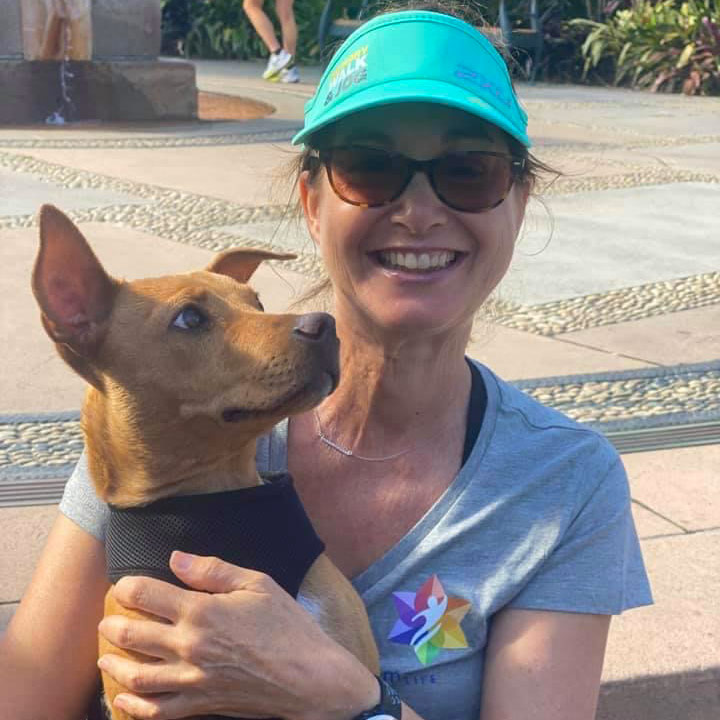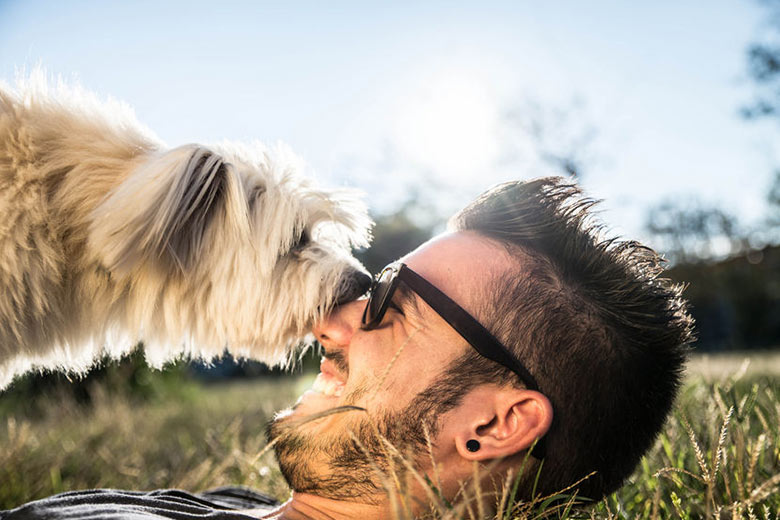How much exercise does my puppy need?
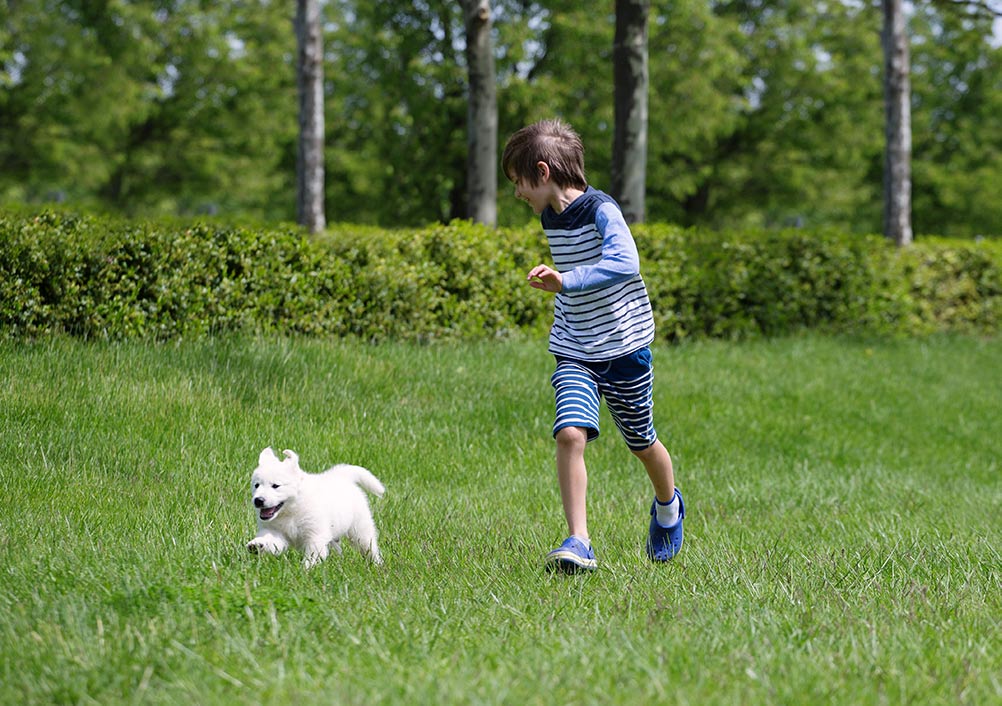
Most puppies are little balls of energy who love to play and run about, but even so, they need regular exercise to stay physically healthy. And if the numerous health benefits aren’t enough motivation, exercising your puppy also gives her the opportunity to socialise with other puppies, older dogs and friendly people, which is so important for her behavioural development.
So, how much exercise does a puppy need?
There are a number of factors to consider when answering this question, including her age, stage of development, health, size and breed, making each puppy’s exercise needs slightly different.
Puppy’s age and stage of development
Providing your puppy with the appropriate amount of exercise for her age and stage of development – not too little and, just as crucially, not too much – is very important. Young puppies have different exercise requirements from older puppies, and while they may seem to have more energy than older dogs, puppies of all ages do not need as much exercise as adult dogs.
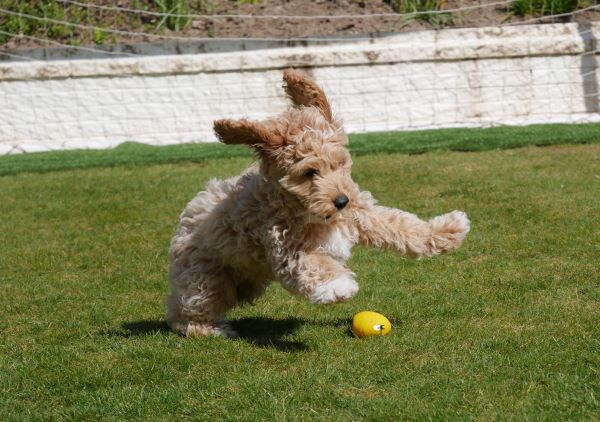
Puppy’s breed
Another factor to take into account is your puppy’s breed. Some breeds are notoriously more active than others; think Border Collies or Siberian Huskies! Then there are breeds such as Bulldogs who may struggle with exercise. Ideally, your own and your pup’s activity levels match up well, and you aren’t a coach-potato with a super-charged dynamo or a fitness freak with a lazy lump!
Puppy’s breed size
Breed size is another important consideration when it comes to exercise. Toy and small breeds with short little legs need to take many more steps than larger dogs just to walk around the block, so may tire after just a short distance.
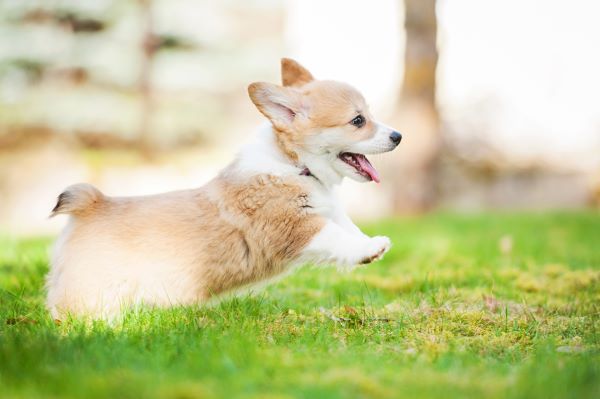
And, while large and giant breed puppies may look like they are capable of a far longer walk or even a run, it’s not recommended. Studies have shown a correlation between excessive exercise and orthopaedic disorders in large-breeds, and experts recommend waiting until large breed pups reach physical maturity at around 18 to 24 months before ramping up their exercise programs.
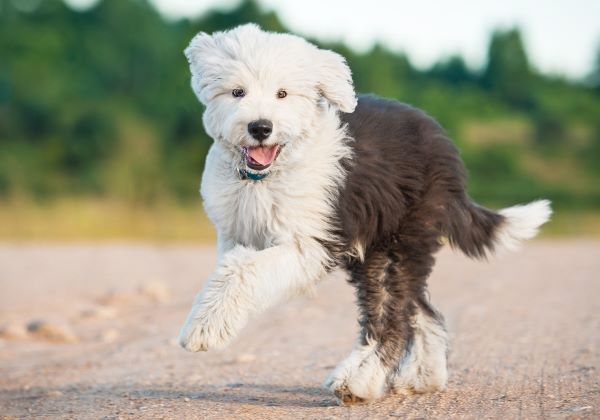
In conclusion…
As a general guideline, it’s advisable to start off taking it very easy with your puppy, keeping exercise limited to a couple of very short walks and play sessions. As you get to know her, look out for signs that she is tiring, and give her plenty of nap-time between sessions.
 The American Kennel Club recommends several – at least three – short bursts of suitable activity throughout the day, including short walks and multiple play sessions. Because their bodies are constantly growing, the AKA explains, several short exercise sessions throughout the day is a much better option than going for one long walk, which could be too hard on a puppy’s developing body.
The American Kennel Club recommends several – at least three – short bursts of suitable activity throughout the day, including short walks and multiple play sessions. Because their bodies are constantly growing, the AKA explains, several short exercise sessions throughout the day is a much better option than going for one long walk, which could be too hard on a puppy’s developing body.
Of course, your puppy’s exercise needs will increase as she grows.
As a general guideline, the UK Kennel Club recommends exercising for 5 minutes for every month of age, twice per day. In other words, gradually increasing the duration of exercise sessions in line with her age, from 10 minutes at 2 months, to 15 minutes at three months, then to 30 minutes at 6 months, etc.
However, every puppy is unique, and your vet is ultimately the best person to give you advice as to how much exercise is appropriate for your individual puppy, taking into consideration any health issues she may have. You can also talk to your breeder, breed enthusiast groups, or other owners of dogs of a similar breed. Finally, take the time to get to know your puppy – the more time you spend together, the more you will learn just how much activity she needs to keep her happy and content.
Puppies are very adventurous and highly accident prone, and often end up hurting themselves whilst they are still growing. Their underdeveloped immune system means they are also vulnerable to getting infections and catching diseases.
Consider pet insurance to help protect you and your puppy from the start. Get your first 2 months cover free 2!
Learn more
- How to exercise your puppy
- How much exercise does my dog need?
- The importance of exercise for adult dogs
- Exercising your senior dog
- Indoor workouts for dogs
- Brain workout – Mental exercise for dogs
- Dog sports: fun activities for dogs & owners
Bow Wow Meow Pet Insurance can help protect you and your dog should an unexpected trip to the vet occur.
-
Find out more about our dog insurance options
-
Get an online pet insurance quote
Bow Wow Meow is proud to have been awarded winner of Canstar’s ‘Most Satisfied Customers’ Award in the Pet Insurance category for both 2024 and 2025!
Bow Wow Meow is proud to have been chosen as Product Review’s Pet Insurance Award Winner every year from 2018 to 2025! This is based on 2,995 independent customer reviews (as at 21/01/2025), with an overall rating of 4.3*
Google Review rating = 4.5* (based on 968 reviews)
Trust Pilot rating = 4.6* (based on 531 reviews)
Bow Wow Meow is proud to have been chosen as Product Review’s Pet Insurance Award Winner every year from 2018 to 2025! This is based on 2,995 independent customer reviews (as at 21/01/2025), with an overall rating of 4.3*
Google Review rating = 4.5* (based on 968 reviews)
Trust Pilot rating = 4.6* (based on 531 reviews)
Bow Wow Meow has been chosen as a winner in the Finder Pet Insurance Awards 2024. Finder’s panel of experts analysed over 140 quotes to award our Ultimate Care Plan the winner of the “Pet Insurance – Value” category.

